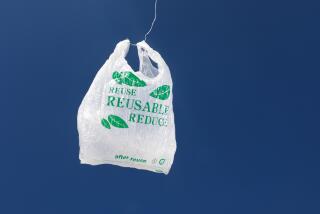Benefits Claimed by Some ‘Green’ Products’ Seen as Dubious : Consumerism: Many environmentally conscious shoppers are confused about marketing claims--with good reason.
- Share via
WASHINGTON — Every new, improved product on the supermarket shelf these days seems to be Greener than Green.
Environmentally conscious shoppers are being offered more ways to preserve the planet while stocking up on cleansers, paper towels, plastic bags and disposable diapers.
Unfortunately, some of the assertions sprouting on the new ecology-friendly packages are misleading, confusing or possibly even fraudulent.
“So many of these claims don’t mean anything,” said Joel Makower, publisher of the monthly Green Consumer Letter. “Consumers are becoming discouraged early on. I’m afraid we’re losing them before we get them firmly in the green consumer fold.”
Makower said shoppers who bought supposedly degradable plastic trash bags were turned off when they learned the bags will not really decompose in landfills, which is where they are likely to wind up.
Similarly, consumers picked up supposedly earth-friendly aerosols only to find that ozone-destroying chlorofluorocarbons have been replaced by other suspect chemicals. Or they purchased “recyclable” plastics, then found that no recycler would accept them.
Much of the confusion about marketing claims can be traced to underlying policy questions that have not been settled.
What is the best way to deal with solid waste? Make biodegradable products, even if they can’t be recycled? Push recycling to the limit, accepting that nothing decomposes in a landfill anyway? Or reduce packaging to a minimum, even if what’s left is neither recyclable nor biodegradable?
Meanwhile, federal and state investigators are looking into whether consumers are being deceived by some advertising or packaging asserting environmental benefits.
“We’re very concerned with the number of claims that we’re seeing,” said Julie Vergeront, assistant attorney general in Minnesota, one of 10 states that formed a task force this year to work together on cases involving environmental products.
Seven of the states filed suit against Mobil Corp., saying that its Hefty trash bags, advertised as biodegradable, would not break down in landfills. The suit has been settled in Texas but is still pending in the other six states.
In another case, the maker of Bunnies disposable diapers agreed to stop claiming the product was biodegradable. The diapers could degrade under the right circumstances but not in landfills, which is where nearly all the diapers end up.
The manufacturer, American Enviro Products of Placentia, also agreed to redesign the diapers to use thinner plastic and cotton in place of paper. The new package will say that using Bunnies instead of other disposable diapers saves trees.
“They let us off the hook because they thought we were moving in the right direction environmentally,” said Robert Chickering, the company president.
“We’re going to give up on biodegradability,” he said--even though he still believes there may eventually be an environmental benefit to having degradable waste in landfills.
The Federal Trade Commission is pursuing at least a dozen investigations into environmental product claims but can’t discuss the details yet, said Barry Cutler, director of its consumer protection bureau.
Cutler said the commission is trying to make sure that its enforcement does not give an unfair advantage to paper products over plastic, or vice versa.
To help puzzled shoppers and to verify product claims, two rival certifying agencies have sprung up.
The first to begin operations was Green Cross Certification Co., based in Oakland. Since June, it has authorized 60 products to use its logo with specific statements of environmental virtue.
Renew-brand trash bags, for instance, are certified to contain at least 80% recycled plastics. Clorox 2 bleach comes in a box that Green Cross has verified is made from 81% recycled paper fibers.
“We’re very specific with our claims,” said Stan Rhodes, president of Green Cross. “We really need to clean up the confusion in the marketplace.”
A competing outfit, Green Seal Inc., is planning more ambitious endorsements and hoping to announce early next year the first products that have met its standards.
“We’re trying to identify products that over their entire life cycle are better for the environment,” said Norman Dean, executive director of Green Seal, which is based in Washington. “We think consumers want to know about the overall impact on the environment.”
Cutler said the FTC is watching the environmental certification groups closely, worried that over-broad endorsements could add to consumer confusion rather than clear things up.
Much of the bewilderment, he said, doesn’t really stem from advertising claims or scientific uncertainty but to the unsettled policy questions.
“The real issue is having an environmental policy about the best way of disposing of solid waste,” Cutler said. “The real issue is what we do with the garbage itself, not what we put on the box.”
More to Read
Inside the business of entertainment
The Wide Shot brings you news, analysis and insights on everything from streaming wars to production — and what it all means for the future.
You may occasionally receive promotional content from the Los Angeles Times.










